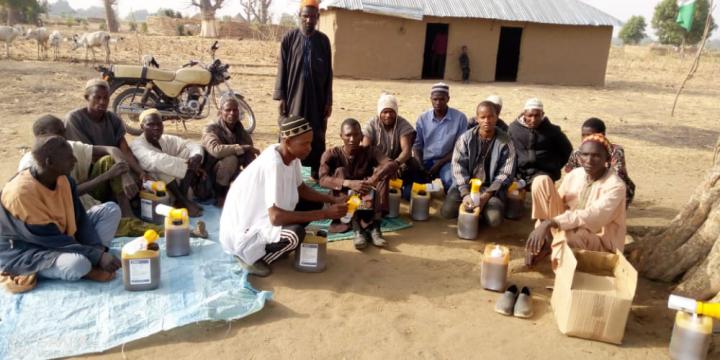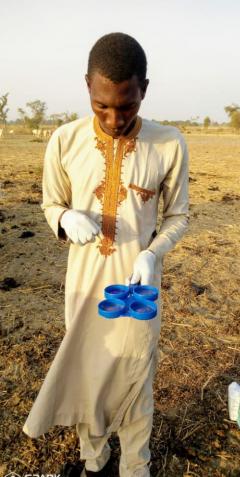Pandemic lockdowns take their toll on Nigeria’s livestock keepers
As Nigeria eases COVID-19 restrictions, Livestock Officer Abdulkadir Musa Mohammed reports on the challenges to livestock-dependent communities

by Abdulkadir Musa Mohammed
The COVID-19 pandemic has affected virtually all aspects of life in Nigeria, including the work of Local Extension Officers (LEOs) such as myself, other veterinary workers, and the livestock keepers we take care of. At the end of March, the Nigerian government enforced various measures to contain the spread of the virus including prohibition of large gatherings, observing social distancing, improving hygiene, movement restrictions, and total lockdown. Now the lockdown is lifting but the impacts remain.
Veterinary workers face increased pressure
In normal times, I and other veterinary workers would pay daily visits to farms in different communities to treat Pastoralists' animals. We became one of the groups of people who were adversely affected by the pandemic. Most LEOs, who like me depend on our jobs for a living, were confined in one place as a result of the lockdown and movement restriction orders. This prevented us from carrying out our normal work. In addition to this, veterinary research institutions, clinics and animal medicines were not available or accessible, making it difficult to buy drugs for treatment and submit samples to laboratories for testing when the need arose. This has affected the livelihood of LEOs and has sadly disrupted many ongoing important research projects, including Mastitis Management and Control in dairy cattle in Nigeria, which is sponsored by the Supporting Evidence-Based Intervention Initiative (SEBI).

Livestock keepers struggle under lockdown
Another group of people who were affected by this pandemic were pastoralists. Nigeria is one of the few countries still practising an open grazing system. The nature of pastoralism in Nigeria requires constant movement of pastoralists in search of pasture for their livestock. Much worse, inter-state movement restrictions confined pastoralists to areas with a shortage of pasture, and this lasted until the beginning of the wet season, when most pastoralists were expected to return to their localities.
For example, pastoralists in the Wase Local Government Area of Plateau State traditionally migrate to neighboring states in southern and south eastern parts of the country during dry seasons in search of pasture, and normally return at the beginning of every wet season. This long-practised tradition was impossible due to the movement restrictions order.
Shuaibu Adamu, a pastoralist, told me how his relatives and many others were stopped with their livestock by the inter-state border securities on their way back to their localities from Nasarawa State. They were left stranded for a whole day before being released. So many pastoralists were forced to stay in the neighboring states beyond their plans.
Another pastoralist, Alh Hassan Ahmed Ja'oji disclosed to me how life was difficult for them in their community during the Covid 19 Lockdown. “It was a very difficult moment. We usually buy almost everything from town and there were some things that we cannot buy in bulk due to their perishable nature and lack of proper storage facilities. As a result of that, there was a scarcity of food which resulted in hunger. The market value of animals dropped drastically because markets were closed and there were no buyers available. This in turn has caused unbearable economic hardship for us. It was impossible to treat our animals, as drugs and veterinary workers were difficult to access. SEBI has provided timely support by providing some pastoralists with anthelmintics as part of the mastitis control programme, closing the gap of drugs scarcity,” he explained.
Women who are involved in the dairy business were also seriously affected as they could not go out to sell milk. They were forced to stay at home helplessly as their businesses completely stopped. I chatted with one of the women and she told me how frustrating it was for her to live during the lockdown period. “I have never faced this kind of situation in my life and I'm praying not to have to witness this again in my life,” she lamented.
Looking ahead – time to take action
Normal daily activities are beginning to resume in Nigeria, as lockdown was officially relaxed and the government had informed all citizens to take responsibilities for their own health by adhering strictly to WHO's Covid 19 guidelines. Although strict COVID-19 restrictions lasted for only few months, the hardship and economic damage it caused will continue to be felt for a long time. One of these hardships is the current hike in the price of food commodities. This perhaps was the major reason that prompted the Nigerian government to relax lockdown and movement restrictions amidst Covid 19 pandemic.
This crisis has made clear that our government has not been paying proper attention to pastoralists. Many important programs aimed at improving the lives of pastoralists were introduced by the past governments, but these were never actualised. The National Livestock Transformation Plan initiated by the present administration is aimed at improving livestock systems in Nigeria and our pastoralists are very happy and ready to be part of it, although implementation has been very slow. The pandemic has added significant uncertainty to our lives, and this is beginning to put fear in the minds of our pastoralists.
It will be very helpful if SEBI and other groups that invest in livestock development, can find a way of giving their support to fast-track the implementation process. I believe this is the only way to make the pastoralists more independent and productive in the future.
Abdulkadir Musa Mohammed is a Local Extension Officer implementing a Mastitis Management and Control in dairy cattle in Nigeria, sponsored by Supporting Evidence-Based Intervention Initiative (SEBI).
More information

